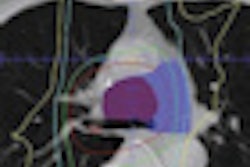
LONDON (Reuters), Aug 11 - A 15-minute brain scan could someday be used to test for autism, helping doctors diagnose the complex condition more cheaply and accurately.
British scientists said on Tuesday their rapid test had proved more than 90% accurate in adults and there was no reason why it should not work equally well in children.
It could be a boon for patients and their doctors by reducing reliance on time-consuming and emotionally trying assessments based on interviews and behavioral observation.
The new scanning method -- which picks up on structural changes in the brain's grey matter -- could be ready for general use in a couple of years. The next goal is to test it in children.
"What we are working on now is to see if we find the same results in younger people," research leader Dr. Declan Murphy, professor of psychiatry at King's College London, said in an interview.
"We would hope that it would work just as well ... there is no reason why not."
The ability to base a diagnosis on an objective biological test, rather than having to rely on personality traits, should mean patients get treatment more quickly, he added.
Dr. Murphy and colleagues, who published their findings online August 11 in the Journal of Neuroscience, studied 20 healthy adults and another 20 individuals previously diagnosed with autism spectrum disorder.
The accuracy of the scan in predicting autism was so high that the results were strongly significant, despite the small number of patients involved.
Experts not involved in the research applauded the research but cautioned further study was still needed.
"Although this method is not ready for normal diagnostic situations, any step to easier diagnosis is welcome," said Dr. Terry Brugha, professor of psychiatry at the University of Leicester.
Dr. Murphy said he envisaged that in the future autism specialists would use a scan alongside interviews, in much the same way as doctors monitoring diabetes look at blood test results alongside patient histories.
The new system works by analyzing variations in the shape and structure of brain regions linked to language and social behavior, using standard magnetic resonance imaging.
The speed of the test makes it some 20 times cheaper than traditional tests, which can take a team of doctors four to eight hours to conduct. The actual brain scan costs around 100 pounds (U.S. $156).
By Ben Hirschler
Source: http://link.reuters.com/cyj54n
J Neurosci 2010.
Last Updated: 2010-08-11 13:49:08 -0400 (Reuters Health)
Related Reading
MEG shows slow response in autistic kids, January 8, 2010
BOLD fMRI may identify the underlying characteristics of autism, November 10, 2009
MRI spots brain abnormality in autistic children, May 4, 2009
Finger tapping with fMRI reveals autism secrets, April 28, 2009
MEG reveals sound processing delays in autistic children, December 2, 2008
Copyright © 2010 Reuters Limited. All rights reserved. Republication or redistribution of Reuters content, including by framing or similar means, is expressly prohibited without the prior written consent of Reuters. Reuters shall not be liable for any errors or delays in the content, or for any actions taken in reliance thereon. Reuters and the Reuters sphere logo are registered trademarks and trademarks of the Reuters group of companies around the world.

















